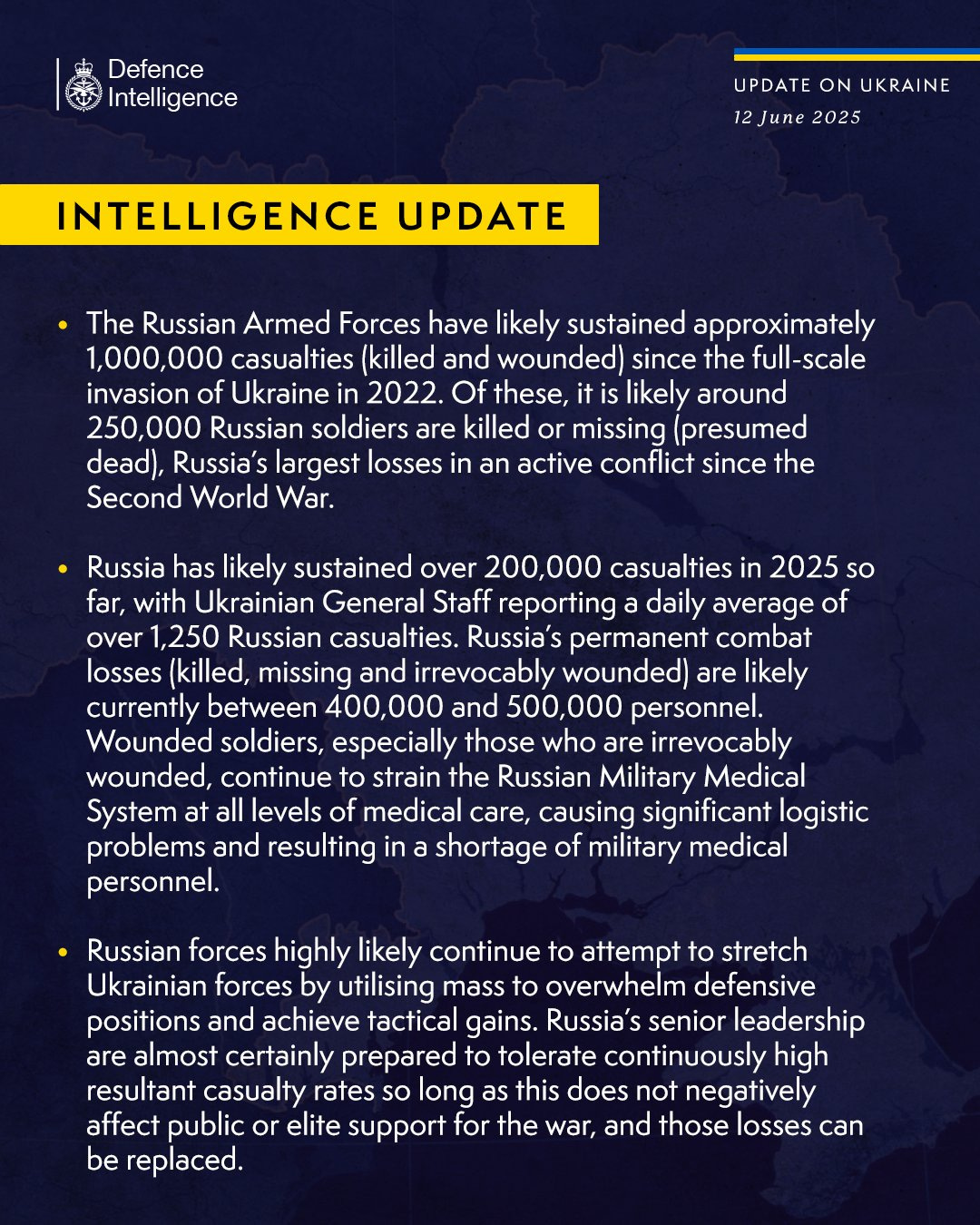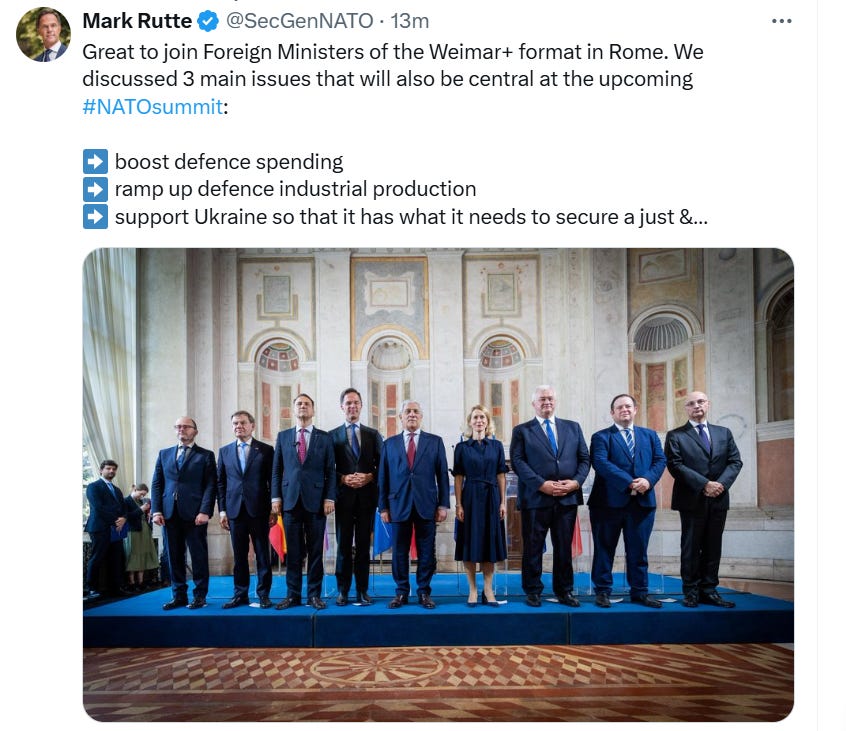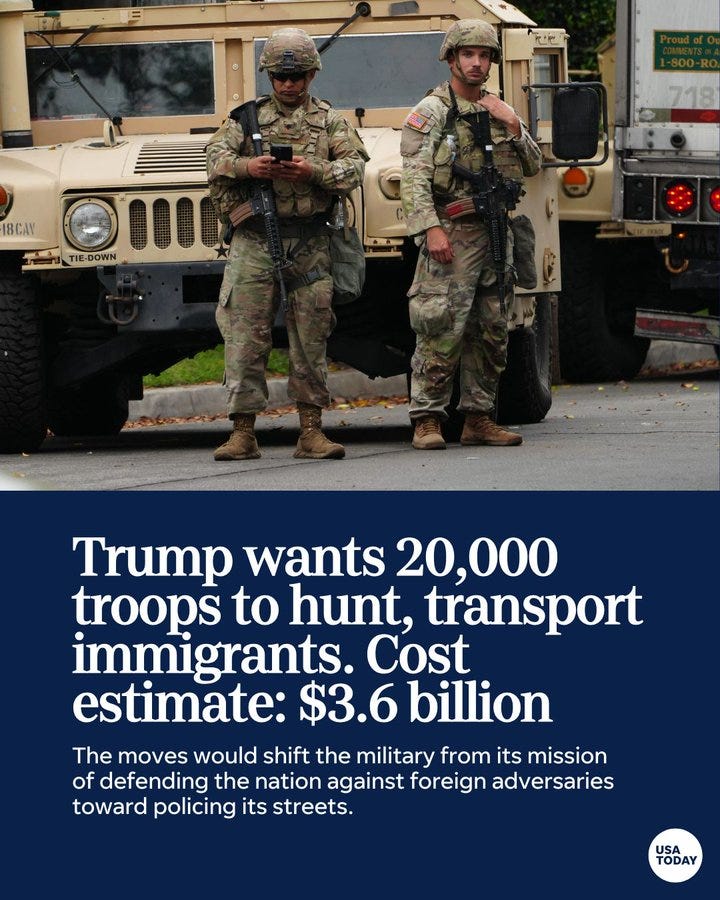Catching up…
For a general view of news from various geopolitical threatres, Scott’s EA Worldview is always superb.
Let’s get going…
Stories we’re following…
Ukraine repatriates bodies of 1,212 fallen soldiers. The remains of soldiers were returned from multiple front-line regions, including Kharkiv, Donetsk, Luhansk, Zaporizhzhia, Kherson, and Sumy oblasts.
12 injured in Russian drone attack on Kharkiv, day after fatal drone bombardment. Twelve are injured, including 4 children as a result of a Russian drone attack on Kharkiv overnight on June 12.
Russian forces attacked the Huliaipole hromada in Zaporizhzhia Oblast on 12 June, killing one person and injuring three others. [A hromada is an administrative unit designating a village, several villages, or a town, and their adjacent territories – ed.] reported Ivan Fedorov, Head of Zaporizhzhia Oblast Military Administration, on Telegram. A 60-year-old man had been killed, while two men aged 65 and 62 and a 58-year-old woman had been taken to hospital. The strike destroyed houses, with a fire breaking out in one of them.
United24: “Every morning when I wake up, I keep looking for my family. I believe I just had a terrible dream. I search for them — but they’re not there." In an interview with ABC News, president Zelensky shared the story of a man from Kryvyi Rih whose 3 children and a wife were killed by russia.
Zelensky tells Politico: “Russia is simply lying to Trump. Most world leaders see it—I hope America does too.” He warns a Russian "victory" is Kremlin fiction, Putin only understands strength, and U.S. withdrawal would be the Kremlin’s dream.
ISW: Occupied Crimea is poised to face a severe water crisis in the coming months, a crisis that the Russian occupation of Crimea has precipitated and which ongoing Russian mismanagement and resource misallocation will exacerbate.
Kremlin-appointed Russian Commissioner on Children’s Rights Maria Lvova-Belova tacitly acknowledged that Russia has illegally deported Ukrainian children. Lvova-Belova’s statements further confirm the illegality of Russia’s behavior vis-à-vis Ukrainian children.
Another major prisoner exchange: Ukraine has secured the release of a group of severely wounded and ill defenders held in Russian captivity, including Mariupol soldiers imprisoned for over 3 years. Some had been listed as missing. All will receive full medical, psychological, and financial support.
As of July 1, the organization documenting Russian war crimes in Ukraine will cease operations and lay off all staff, CNN reports. Previously funded by the U.S. State Department, support was cut this year due to government budget reductions.
In the Bunker with Darth Putin KGB: Michael Weiss is an american author, journalist, essayist and expert on Russia and the middle east. He's comes back down to the bunker to discuss operation spiderweb as a game changer, and to be honest, how it also isn't. We also get into a whole bunch of other stuff in a great chat.
Combat Situation
RBC: In an address on June 11, Putin stated that Russia must rapidly and significantly increase the capabilities of its ground forces. He emphasized that the nuclear triad remains a guarantee of Russia’s sovereignty and demanded that bases and airfields be prepared in advance for new weapons systems, rather than placing them “in open fields.” Putin added that the new state armament program should become an effective tool for implementing the recently approved Strategy for the Development of the Navy for the Period up to 2050.
President Zelensky: Ukrainian forces are gradually pushing Russian troops back in the Sumy region, based on a report from Commander-in-Chief Oleksandr Syrsky. Unconfirmed reports suggest that Yablunivka has been fully liberated, and Ukrainian forces have advanced into four more settlements.
Units from Ukraine’s Unmanned Systems Forces, in coordination with other defence forces units, have hit an important facility of the Russian defence industrial base – the Rezonit technology park in Moscow Oblast – on the night of 11-12 June, as reported by the General Staff of the Armed Forces of Ukraine on Facebook.
Quote from the General Staff: "Explosions were recorded on the territory of the Rezonit technology park, located in Zubovo in Moscow Oblast. This is a plant for the mass production and assembly of printed circuit boards and electronics manufacturing. Its products are widely used in the production of high-tech weapons and equipment."
Ukraine has unveiled its new strike-reconnaissance drone "Bulava," described by Minister Mykhailo Fedorov as the Ukrainian answer to Russia’s Lancet. The Bulava is capable of precisely hitting targets deep behind enemy lines, including electronic warfare systems, air defense assets, and other high-value objectives. It can engage both stationary and moving targets and transmits real-time footage of its strikes.
On June 11, 2025, in connection with so-called heightened security measures, widespread disruptions to mobile communication services were reported across 19 regions of the Russian Federation. According to Russian state media, cities including Krasnodar, Tyumen, Omsk, Novosibirsk, and others experienced outages affecting taxi services, banking systems, payment terminals, as well as LTE and 4G connectivity.
Behind the Lines
Russia’s large-scale jamming of GPS signals over the Baltic region is expanding, warns Lithuanian Vice-minister of National Defence Karolis Aleksa in an interview to Delfi.
Nordic-Baltic Eight: A group of northern countries is gaining weight as a geopolitical anchor. Known as the Nordic-Baltic eight (NB8 in diplomatic jargon), it brings together small northern European states that, individually, might have little clout in international security and politics.
Denmark, Estonia, Finland, Iceland, Latvia, Lithuania, Norway and Sweden established their regional cooperation format in 1992, after the end of the cold war, with regular meetings of prime ministers, parliamentary speakers, foreign and defence ministers and senior government officials. It began as a forum for wealthy, stable Nordic countries to rebuild bridges with Baltic neighbours with whom they had traded and exchanged for centuries but who had been trapped behind the iron curtain under Soviet rule since the second world war.
The group’s salience has grown in the new geopolitical era of great-power rivalry in which the Arctic, the North Atlantic and the Baltic Sea have once again become strategically contested zones. “The world is changing rapidly … the most important thing is to rearm Europe,” the Danish prime minister, Mette Frederiksen, the present chair of the NB8, said in explaining why Copenhagen no longer sees its place as one of the ”frugal” countries opposed to higher EU spending. Denmark will also hold the rotating presidency of the Council of the European Union from July, giving the Nordic region greater visibility.
Both Nato and the EU are drawing extensively on the “total defence” playbook of Finland and Sweden to engage the public and private sectors and civil society in military readiness, civil preparedness and economic resilience in the face of Russian and Chinese hybrid warfare tactics. There is much to learn from their whole-of-society approach.
The NB8 members regularly caucus before Nato and EU meetings – although Norway and Iceland are not EU members – and coordinate their diplomacy worldwide. Symbolically, the Nordic five share an embassy complex and cultural centre in Berlin, capital of Europe’s biggest economy. [continue reading]
ICIJ: A vast cargo ship called the Med Sea Eagle, which remains stranded in Benghazi’s port, has become a floating symbol of the lawlessness dogging the commercial shipping industry. In June 2023, it was reportedly abandoned by its owners off the coast of the United Arab Emirates.
Then, a year later, the Med Sea Eagle was involved in possible sanctions dodging. As it crawled along the Suez Canal, its new owner sent an urgent email to the European naval mission tasked with enforcing an arms embargo on Libya. He warned that the Med Sea Eagle’s new crew had been bribed to carry “suspicious cargo,” including speedboats and “military tactical” vehicles, to Benghazi, leaked documents show.
The naval mission ultimately failed to stop the shipment. And a U.N. report later confirmed some of the cargo reached Khalifa Haftar, a rogue military strongman who holds sway in Libya’s east, although authorities could not determine if it violated the arms embargo.
Shipping companies willing to break the law “find that there are very few restraints on criminal conduct,” said Alexandra Wrage, the president of the anti-corruption association TRACE.
Republicans press Pentagon chief over Trump’s plan to end Russia's war against Ukraine, Politico reports. U.S. Defense Secretary Pete Hegseth on June 11 stood by the administration’s approach, portraying a U.S.-brokered peace deal as a sign of strength and admitting that any agreement would inevitably leave “plenty of people on both sides” dissatisfied.
Secretary of Defense, Pete Hegseth, appeared before the Senate Appropriations subcommittee to discuss the Department of Defense's 2026 budget.
Meanwhile in Russia & China…
ISW's New Adversary Entente Task Force: Russia, China, Iran, and North Korea are increasingly cooperating to undermine US national security and defense; challenge US leadership and global power; split and weaken America's regional allies; and establish their own mutually empowered regional hegemonies.
Their growing cooperation in Russia’s unprovoked war of aggression against Ukraine is an alarming sign of the potential for their entente to undertake wider military action.
ISW's recently launched Adversary Entente Task Force offers a holistic assessment of how these four adversaries are aligning their foreign policies, diplomatic engagements, defense industrial bases, and military activities in order to counter US national security interests.
The Task Force evaluates the trajectory of cooperation between these four adversaries, identifies the threats that increased cooperation poses to the United States and its interests, and assesses vulnerabilities within the Entente to support US policymaking.
RIA Novosti: Trump found a window in his schedule to meet Darchiev. "I just came from the White House. The President of the United States of America found a window in his busy schedule to accept the originals of the credentials and meet in person on the eve of Russia Day," Darchiev said at the embassy.
US-Russia talks to be held in Moscow 'very soon,' Russian ambassador claims. "I can confirm that the next round of negotiations between the delegations will take place very soon in Moscow," Russian Ambassador to the United States Alexander Darchiev said.
Mo: I really have no words to describe what I felt as I read the message below from the U.S. Department of State. The message comes after a period of the most intense missile and drone attacks against Ukrainian cities and civilians to date.
Coupled with Secretary Hegseth’s scripted answer to Mitch McConnell’s question which skirted the entire issue of holding Russia accountable for its war crimes, it’s easy to see that the US administration is placing its focus not on defeating Russia, but on the aftermath of the war. The Trump administration is simply waiting to restore trade and diplomatic relations, allowing the sovereign nation of Ukraine to be attacked daily, and setting aside the security risks that would entail to the U.S. itself and allied partners in Europe.
Sadly, it also serves to underscore how much the American administration has detached from the respect of international law and international humanitarian law as the Russian forces and the Kremlin continue to brutalize Ukrainians and degrade their capabilities.
Yuri Gugnin, the founder of the crypto company Evita Pay, has been arrested in New York. He is accused of laundering $530 million through cryptocurrency from russian banks to buy American technology for russia in circumvention of sanctions. He faces life imprisonment.
AFP: Russian pensioner Roman Paltievich stared at the prices for apricots, tomatoes and watermelons stacked high on stalls at a Moscow market -- foods that he now struggles to fit into his budget. "The prices were crazy," he said.
Russia's three-year-long military offensive on Ukraine has caused inflation to surge at home, a thorn in the side for the Kremlin, which strives to shield Russians from the fallout of its campaign. Meanwhile, deep labour shortages caused by massive recruitment by the army and arms manufacturers, have seen both salaries and prices jump higher.
Paltievich's wife, Tatyana, stood next to him clutching a small punnet of strawberries -- a precious treat for her grandchildren that set her back 400 rubles ($5). "We survived 1991, so now we're not afraid of anything," she said defiantly, in reference to the collapse of the Soviet Union and the economic chaos that followed.
Andrea Opachi: Aksionov, collaborator of the criminal Putin regime, calls on the Russian diasporas in the West to organize MASS riots in support of the war against Ukraine. The goal? Destabilize and influence public opinion. It is hybrid warfare. We are all at war.
Russia is cultivating a pro-Kremlin African elite through state-funded education and youth programs, warns Ukrainian intel rep Andriy Yusov. Moscow expands influence by offering scholarships and syncing curricula, using education & sports as hybrid tools to shape loyal future leaders. (See yesterday’s post.)
Kyiv Insider: Russian government budget revenues continue to collapse as the combined weight of war spending, international sanctions, and systemic mismanagement tears into the foundations of its economy. In May 2025, the Kremlin recorded a federal budget deficit of 167.7 billion rubles—despite May traditionally being a month of budget surpluses for Russia.
Total federal revenues for May fell to 2.46 trillion rubles, a 6Mo% drop compared to the same month last year. The collapse is driven primarily by a catastrophic 35% year-on-year fall in oil and gas revenues, which plunged to just 512.7 billion rubles. Non-oil revenues, once a rare bright spot, grew only 8% year-on-year—well below the country’s 10% inflation rate, indicating a contraction in real terms.
For a regime that built its fiscal policy around energy rents and wartime mobilization, the numbers are devastating. Since February, non-oil tax revenue growth has steadily slowed, while oil-linked revenues have plummeted. The sharp decline in hydrocarbon income reflects both lower global prices and tightening enforcement of Western sanctions targeting Russia’s shadow fleet and energy export channels.
Mo: Please consider what is missing—the Russian National Wealth Fund and the companies that the Kremlin is now pillaging to beef up the economy. They would have to be factored into the calculations presented in the article. Madi Kapparov, a EuroFile contributor, pointed out that the worse is yet to come for Russia, but Russia has proven to be quite creative in the past. Russia’s economic health will depend largely on the revenues from oil and gas that they obtain through trade using the shadow fleet, and if oil prices fall considerably. Kapparov added that there are too many moving parts to begin thinking of a total economic ‘collapse’ as of yet.
WSJ: Chinese Spyware, Only $6.99
A dilemma of dealing with Chinese companies in a free society like America is their mandated allegiance to the Chinese Community Party.
That’s the subject of a state lawsuit filed Wednesday that says the e-shopping platform Temu and related app Pinduoduo are putting the data of American citizens at risk. In the complaint filed in state court in Nebraska, Attorney General Mike Hilgers says Temu installs malware that gives the app access to “sensitive information.”
This includes the microphone, messages, photos and “information sufficient to track their movements.” The malware is also designed to operate secretly and “avoid detection,” the lawsuit alleges.
Temu and Pinduoduo present themselves as e-commerce apps that offer inexpensive merchandise, but they are also in the business of data collection. The lawsuit notes that, according to an IT security firm report, “Pinduoduo requested as many as 83 permissions, including access to biometrics, Bluetooth, and Wi-Fi network information.”
Tengri News: The Kazakh government is doing a full review of the MOD spend and corruption. In 2025, the department spent 262 million tenge on purchasing such souvenirs: figurines with Swarovski crystals, gold pens, watches with snakeskin straps and expensive musical instruments. Tengrinews.kz continues a series of materials on the spending of budget funds and in this article describes in detail the purchases of the Ministry of Defense, shows photographs of things and tells how the department itself explained the need for such expenses.
In Europe…
June 11: Greek court strips three far-right MPs of seats over electoral fraud. In an unprecedented step, judges ruled that voters had been “deceived” in general elections two years ago because, although Vasilis Stigkas was described as the party leader, there was another person pulling the strings: Ilias Kasidiaris, an unrepentant neo-Nazi and former leader of the now disbanded Golden Dawn. Parties in Greece legally cannot run in elections if their “real leaders” have been convicted of crimes such as participating in a criminal organisation.
June 11: The sentencing on Tuesday of Robert Agius and Jamie Vella, reported to be members of the island’s criminal underworld, marked a significant step in the long campaign to bring those charged with Caruana Galizia’s murder to justice. Her death in October 2017 sparked outrage across Europe and embroiled Malta’s governing party in accusations of a coverup, ultimately leading to the resignation of the then prime minister, Joseph Muscat.
Reuters: British finance minister Rachel Reeves prioritised spending on health, defence and infrastructure projects to drive economic growth in a bid on Wednesday to reboot the Labour government's offer of a brighter future to increasingly disillusioned voters. Setting out day-to-day budgets for government departments from 2026 to 2029 and investment plans out to 2030, Reeves said the priorities of her spending review were those of the "working people" whose interests Labour has said it will focus on.
Germany hopes to provide ~€9 billion in support to Ukraine, said Defense Minister Boris Pistorius. Berlin initially planned €4B in aid for 2025, raised it to €7B, and now aims to add another €1.9B. Germany will also co-finance long-range weapons production for Ukraine.
Secretary of Defense, Pete Hegseth appeared before the Senate Appropriations subcommittee to discuss the Department of Defense's 2026 budget (see full video above). His comments questioning the strength and commitment of American allied troops was unacceptable to some of those on the committee and was highly criticised by European authorities that had fought in wars alongside the Americans.
Decode39: Rome outlines funding priorities ahead of July’s MFF negotiations. The interministerial summit produced a 12-page non-paper integrating proposals from across government and set the stage for detailed talks on bespoke external funds, eurobonds for defence, co-financing of EU space programmes and digital taxation rules.
Greek PM Mitsotakis has proposed a 700 km transport corridor linking the port of Alexandroupolis to Odesa via Bulgaria and Romania. The initiative, announced at the Ukraine–Southeastern Europe Summit, aims to attract EU funding and boost regional connectivity.
Maia Sandu requests support from Romania to counter cyberattacks ahead of the autumn elections.
Denmark has voted overwhelmingly in favour of a new defence agreement giving the US “unhindered access” to its airbases.
The deal, which has been strongly criticised by politicians and human rights experts, means US soldiers in Denmark will remain under US jurisdiction. It gives US soldiers access to Danish airbases in three Danish cities – Karup, Skrydstrup and Aalborg – and grants American soldiers and military police powers over Danish civilians at these locations and outside them.
ICIJ: Canadian lawmakers have called for the government to implement a newly adopted law against foreign interference following reports by ICIJ, CBC News and other media partners that the Chinese government targeted dozens of Chinese dissidents living in Canada. Danish politicians call for government inquiry into transnational repression following China Targets investigation
Lawmakers from across the political spectrum condemned Beijing’s “scary” tactics and said European governments should do more to protect dissidents.
Inside China Targets: A live conversation and Q&A with ICIJ journalists
In other news…
Air India Flight 171, carrying 242 people including 2 pilots and 10 crew, has crashed in a residential area near Ahmedabad while en route to the UK. It has been reported that there is one survivor from a Gatwick Airport-bound plane carrying 53 British nationals which crashed shortly after take-off in India, a police commissioner has said.
A video of the incident circulating online shows the Air India aircraft, which was carrying more than 240 people, flying over a residential area before crashing, creating what appears to be a huge fireball followed by large plumes of black smoke.
Images of the aftermath of the crash showed parts of the plane embedded into a residential building as firefighters continued to tackle the smoke.
Viswashkumar Ramesh, a British national, is the only known survivor of Air India Flight 171. He's quoted as saying: "30 seconds after takeoff there was a loud noise and then the plane crashed. It all happened so quickly. When I got up there were bodies all around me"
Authorities in Gujarat have begun preparations for DNA testing to help identify victims of the Air India Flight 171 disaster.
“Most of the bodies have been charred beyond recognition,” said Vidhi Chaudhary, a senior police officer in Ahmedabad, where the London-bound Boeing 787 crashed shortly after takeoff.
The Cipher Brief: The U.S. is on high alert and drawing down nonessential diplomatic and military personnel across the Middle East. Officials cited “heightened security risks” for the move.
Secretary of State Marco Rubio authorized the departure of nonessential personnel in the U.S. Embassy in Baghdad. The State Department is also authorizing the departure of nonessential personnel and family members from Bahrain and Kuwait. White House spokesperson Anna Kelly confirmed “this decision was made as a result of a recent review.” Secretary of Defense Pete Hegseth has likewise authorized “the voluntary departure” of American troops’ dependents across the Middle East.
While officials have not publicly linked the drawdowns to a specific threat, they come amid heightened tensions between the U.S. and Iran as nuclear negotiations continue. U.S. intelligence officials have grown increasingly concerned that Israel may strike Iran’s nuclear facilities if those nuclear talks collapse. Iranian officials have warned that the U.S. would be seen as complicit in any such Israeli attack. President Donald Trump said he cautioned Israeli Prime Minister Benjamin Netanyahu against any such military action, favoring negotiations for a deal.
President Trump said in an interview released today that he is getting “less confident” that an agreement will be reached. He specifically cast doubt on whether he believed Iran would agree to end uranium enrichment under a deal, which Tehran has said is a red line.
Trump has said it would be “nicer” to avoid war but has threatened Iran with “bombing” if a deal isn’t reached. U.S. Army General Michael “Erik” Kurilla, the outgoing head of U.S. Central Command, told a congressional hearing on Tuesday that the U.S. military is prepared to respond with force if Iran does not abandon its nuclear ambitions. “I have provided the secretary of defense and the president with a wide range of options,” Gen. Kurilla said.
Official Readout: Sec of State Rubio met with Kazakhstan Deputy Prime Minister-Foreign Minister Murat Nurtleu today to reiterate the United States’ commitment to Kazakhstan’s independence, sovereignty, and territorial integrity.
Secretary Rubio and Deputy Prime Minister-Foreign Minister Nurtleu discussed expanding opportunities for bilateral trade and investment, and the importance of trusted infrastructure and a favorable regulatory landscape for U.S. companies in Kazakhstan. The United States intends to continue working with Kazakhstan to expand security cooperation, promote regional integration through the C5+1 diplomatic platform, and explore mutually beneficial commercial opportunities, particularly in the technology and critical minerals sectors.
USA Today: The Pentagon is reviewing a Department of Homeland Security request to deploy more than 20,000 additional National Guard troops to aid the Trump administration's widening crackdown on illegal immigration around the United States, according to officials and documents.
The situation in Colombia is extremely serious. At least 16 terrorist attacks were reported on Wednesday morning alone. Shootings, car bombs, motorcycle bombs, hitmen, among others. Total chaos in the country on account of the up-coming election. An opposition politician was shot at point blank during a rally a few days ago.
The U.S. embassy in Panama announced Wednesday that the U.S. is helping Panama replace Huawei Technologies Co.’s telecommunication towers with U.S. technology, the latest move by the Trump administration to counter Chinese influence in the region. The embassy said the U.S. will work with Panama’s security ministry to replace the Huawei towers with seven new telecommunication towers which use “trusted U.S. technology” over the next two years. The effort will cost $8 million.
The Washington Post: the FBI leadership is pushing to move the FBI’s elite National Academy, from Quantico, Virginia, to Huntsville, Alabama. The proposed move is part of FBI Deputy Director Dan Bongino’s effort to shrink the FBI’s footprint in the Washington, D.C., area. The National Academy offers a 10-week training course to local and international law enforcement and federal agents not with the FBI.
Protesters plan nationwide anti-Trump rallies on June 14 to counter the military parade and Trump’s birthday, expected to be the largest single-day protest of his presidency. Millions may join “No Kings” actions in over 1,500 cities.
An official Homeland Security post on X: “Help your country locate and arrest illegal aliens. To report criminal activity, call 866-DHS-2-ICE (866-347-2423).”
More U.S. soft power thrown out the window:




















Trump thinks he can use hate to get power. How is that working out.